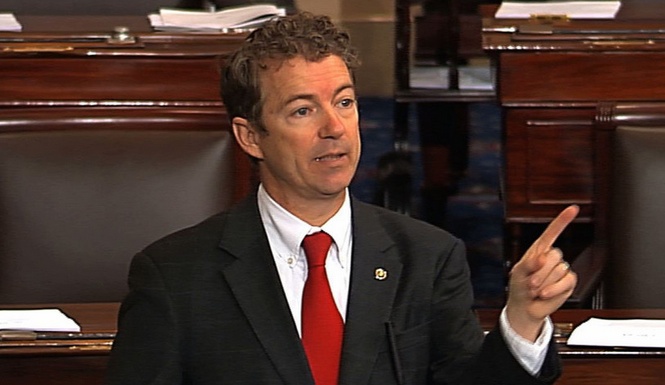What U.S. Foreign Policy Would Look Like Under Rand Paul


Senator Rand Paul's strongest attribute thus far has been his relationship to his father, former Representative Ron Paul. They represent the epitome of contemporary libertarian ideology in Congress. In a recent speech before a dinner in Cedar Rapids, Iowa, the junior senator from Kentucky has strengthened his own credentials — especially in foreign policy — in preparation for a likely 2016 presidential bid.
Even though he gave the speech in Iowa, it carried national significance.
Iowa is well known as the first state to hold a caucus in a presidential election cycle. Ron Paul's campaign in Iowa in both 2008 and 2012 saw him coming in fifth and a very close third, respectively, suggesting momentum is on Rand Paul's side. Taken as part of a probable master plan, the younger Paul is also scheduled to give speeches in New Hampshire later in May and South Carolina next month, both early primary states.
Here are five areas of Rand Paul's strongest foreign policy points.
5. Withdrawal from the United Nations By 2014
As a proponent of small government, Sen. Paul has argued for less spending on international issues and more home-based state's rights. Isolationism may not be the exact word to describe a libertarian foreign policy point of view, but this idea appears to match the definition at first glance. Withdrawing from the world's largest group of countries aimed at promoting everything good from preventing war, promoting human rights, and international law seems far reaching, even for a right-wing GOP senator.
However, Rand Paul has his reasons for justifying such a budget amendment—the national debt. In the next decade, the U.S. will have spent over $7.5 billion on the United Nations.
If the United Nations were to lose the United States, it would deal a massive blow to all of those positive objectives set by the global body. It is almost like a city reducing funding for its first responders; but in this case the city is the whole world and any progress made on anything requires multilateral assistance.
4. The National Debt
Although the national debt is an economic issue, there are foreign creditors. The money that the U.S. borrowed from China to fund wars in Afghanistan and Iraq has placed extra strain on international relationships.
Rand Paul's stance on curbing government spending might be why Tea Partiers are most attracted to him. In this sense, reducing the deficit by $500 billion in a year will help reduce the international credit card and the reliance that goes with it. To make matters more decisive, the House just passed the Full, Faith, and Credit Act by votes of 221-207, raising the issue of which countries to pay first — possibly making some more of a priority than domestic obligations.
3. Drone Strikes
In a move that gained him instant fame, Rand Paul filibustered John Brennan's confirmation as Director of the CIA. The personal, old-fashioned filibuster lasted 13 hours and, although Brennan was still confirmed, Paul raised the important issue of due process, especially as it related to American citizens accused of terrorism.
Senator Paul was right to argue against using drone strikes to kill Americans on U.S. soil. There is no substituting military intelligence over judicial channels and doing so is clearly unconstitutional.
2. Immigration Reform
Due to the tensions within the Republican Party over immigration reform, if Rand Paul were to be too supportive of the current immigration proposal in the Senate, he would likely have lost several Iowa GOP voters. However, in his keynote speech, the Kentucky senator acknowledged that there is a problem with the system, particularly in the work visa program. If it is not fixed, another "comprehensive" immigration reform bill will be necessary in another generation.
The senator has been pragmatic on this issue and can use it as a way to bolster not just his credentials, but help the GOP in the long term. He is right to acknowledge that there is a problem and the best way to fix it is not to obstruct the process, but rather to work with his fellow senators and amend the bill.
1. Benghazi Attacks
Sen. Paul had the most stringent of critiques against former Secretary of State Hillary Clinton when it came down to talking about the Benghazi attacks. In so few words, he blamed Clinton, herself a possible 2016 Democratic presidential candidate, arguing that she should not seek the presidency in 2016, and at the same time strengthening his conservative bonafides if he were to become commander-in-chief.
"There's no excuse in the six months leading up to this … asking for more help … It is inexcusable, it's a dereliction of duty and it should preclude her from holding higher office."
The attacks were a low point in the administration and thwarted any chance of Susan Rice, the U.S. Ambassador to the UN, replacing Clinton as Secretary of State. Rand Paul made it clear that if it were his decision, he would have fulfilled the embassy’s requests for more marines as protection. If that had happened, maybe some lives would have been saved.
Whereas Ron Paul is better known for his stance on removing the Fed and minimizing government's size, Rand Paul has created a name for himself in his own right. It is not just that he joined the Senate Foreign Relations Committee earlier this year, but Sen. Paul has become a vocal advocate on many issues. He has just been more vocal on foreign policy. Whether these are enough to give him an edge in a possible, or eventual, 2016 Republican primary is yet to be seen.
A version of this article first appeared on PolicyMic




